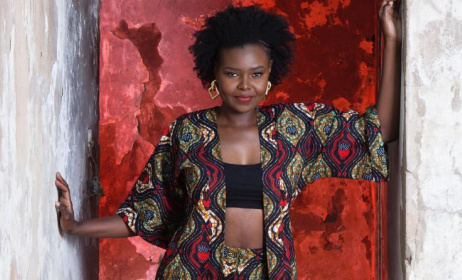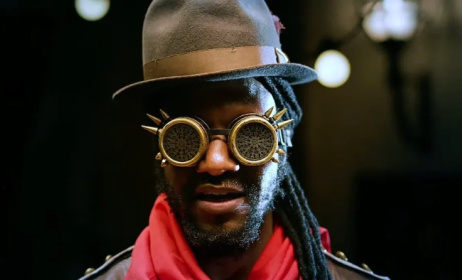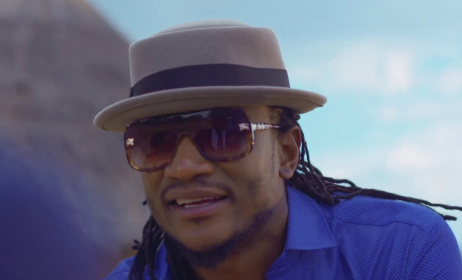Opinion: Is there place for women among Zim’s Big Five musicians?
“If only I knew the things I know now.” This statement is almost a cliché now. I have heard many arts practitioners say it, well, including me. Often, we traverse the same path, perhaps putting on different shoes and expecting to reach a new destination. On many occasions, I have heard female musicians complain that the playing field is not level. Some even go the extent of suggesting there is no ground at all for them, there are just mere pebbles floating. Over the years we, as a society, have managed to objectify female artists in ways that my pen cannot describe.
 Pamela Zulu, popularly known as Gonyeti. Photo: Nehanda Radiozim
Pamela Zulu, popularly known as Gonyeti. Photo: Nehanda Radiozim
A few days ago, I read with dismay an article which suggested that the group of Big Five musicians in Zimbabwe had vacancies. Before the pronounced vacancies we had Tuku, Macheso, Winky D, Sulumani Chimbetu and Jah Prayzah making the elite five. This is a list of highly talented artists, they deserve the fortune and glory they bask in. And, of course, the scrutiny that comes with occupying such a place in a highly opinionated society such as Zimbabwe. Gary Tight, Andy Muridzo and Sam Dondo were the suggested new entrants into the Big Five. Believe me, if our economy was stable, these three represent not just the future but the present and beyond the future. It’s unfortunate that real bucks are only made by the Big Five. They get all the big deals, fanaticised protection, heavy media presence and everything beautiful.
But there is something inherently wrong with that list: Where are the ladies? Are Zimbabwe’s female musicians so pathetic that they cannot even make numbers on the substitute bench? I don’t think so! I think that Fungisai Zvakavapano for instance has been consistent, churning out hit after hit. I understand that to make it in Zimbabwe you have to release hits. Hasn’t Fungisai done that from Day One? She has her own share of controversy, which I think was calculated to capture the limelight, but it all failed because of a reason we all know – she is a woman.
She tried performing in a pub and was persecuted. The moral police thought her place was the pulpit. Still, they followed her and called her a gangster in Christ, after her working together with Killa T. I guess the continued onslaught is what led her to making The Fungisai Pose, which is some sort of corrupted genuflection, typical of varoora. She is still making hits that have changed the Zim dancehall soundscape. Of course, we won’t give her credit but we all know ‘Vanondibatirana’ was beautifully sung, with a catchy melody and everyday lyrics that resonate with every soul. It’s just that she is a woman!
I also think Diana Samkange’s Kwayedza is one of the top albums of 2016. At one time I was tempted to do a comparative analysis of her album with Jah Prayza’s Mudhara Vachauya. These two albums were released on the same day, by the same producers and some songs are actually similar. ‘Mationesa’, for instance, takes the traditional Jah Prayzah style, which in the Zimbabwean music corridors is called chiTsviriyo. I wanted to write about how Diana sings across different Zimbabwean traditional music styles and how Jah Prayzah has done the same, while at the same time crossing over to Afro beats. But, before I could do so, there was news that Jah Prayzah had sexually abused Gonyeti, his former bandmate.
Many did not believe Gonyeti. A lot was said, particularly on social media. One question which recurred was: “Why didn’t she report the case earlier?” “She is a sore loser,” some opined. In the midst of all the harsh words thrown at Gonyeti, I read veteran filmmaker Marian Kunonga’s view in one of the numerous threads I followed. In her lonely comment, buried by many insulting Gonyeti, she retorted that what had happened to Gonyeti is still happening to many women, not just in music, but in the arts industry as a whole. It’s unfortunate that they don’t speak out.
Now that Gonyeti has gathered the courage to speak out, what do we do? She becomes the proverbial sacrifice. We have conjured up all sorts of theories which point to the fact that she invited whatever befell her, whether imagined or real. By extension we have pushed the narrative that female musicians are of loose morals.
It certainly no longer surprises me not to find women among the Big Five, for I know we have made them lesser humans. However, we cannot continue to normalise that. We, or at least I, need role models for my daughter. I don’t want her to look far afield when she thinks of how a successful female musician should look. Women are abused left, right and centre and back and forth, and it’s paining. I will be happy to see even one female band making it into the Big Five. One who will defend and stand for other women. We should not allow the arts to be a thankless and abusive industry for anyone. Perhaps industry is the wrong word. This vocation is just slavery to my sisters.

































Comments
Log in or register to post comments